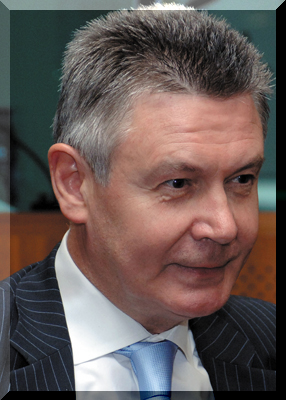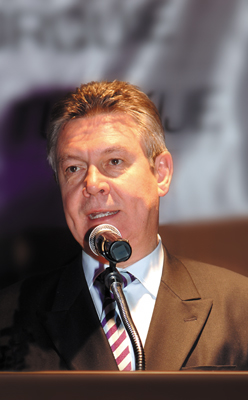| KAREL DE GUCHT | Minister of Foreign Affairs of Belgium |
|
THE EUROPEAN UNION: A COLLECTIVE BRIDGE TO INDIVIDUAL FREEDOM AND COMMON GOOD |

 On August 17th 1585, after a long siege, the city of Antwerp surrendered to the forces of the catholic King Philip II of Spain. In the previous months, all other major cities in the southern Low Countries or present day Belgium had already fallen. In the years that followed, half of the population of Antwerp and some of the most industrious and intellectual segments of the population of the South left for the rebellious United Provinces to the North. It was only one episode in a series of very bloody and devastating wars of that period, where elements of opposing religious identification (Catholic versus Protestant in societies still largely dominated by feudal regionalism), intermingled with growing nation state identification.
On August 17th 1585, after a long siege, the city of Antwerp surrendered to the forces of the catholic King Philip II of Spain. In the previous months, all other major cities in the southern Low Countries or present day Belgium had already fallen. In the years that followed, half of the population of Antwerp and some of the most industrious and intellectual segments of the population of the South left for the rebellious United Provinces to the North. It was only one episode in a series of very bloody and devastating wars of that period, where elements of opposing religious identification (Catholic versus Protestant in societies still largely dominated by feudal regionalism), intermingled with growing nation state identification.
For centuries to come, the nation state would grow as a catalyst for collective identity but, at the same time, as a source of new conflict. Various elements contributed to this growing nation concept, among which language, religion and ethnicity, stood out. But the concept of human identification, as prime mover, a humanistic ideal, took slowly shape as well in the 16th century. It was finally this idea, considering all individuals as basic equals, independent of their ethnical, religious or linguistic backgrounds, that allowed Enlightenment and the concept of basic equal rights and freedoms for each and every individual to take root and flourish. It was this idea that greatly contributed to the abolishment of slavery, promoted religious freedom, and freedom of conscience for every individual. This individual right to respect by the state, supported by sound educational opportunities for all on the basis of equal chances, are a prerequisite for any democratic society to develop and function properly.
This is not to say that Europe was about to embrace these ideals immediately, or totally, nor are they fully accomplished to-day. The nation state-concept combined with the humanistic ideals of the Enlightenment liberated many, but not all. Sometimes it became the basis for new imperial ambitions that would oppress others beyond nation-state borders. Besides the already existing divisive lines based on religion, nation and ethnicity, the concept of class struggle was added in the 19th century. The disastrous two world-wars of the 20th century, with their tens of millions of victims and immense suffering were the result of technological progress and ideological excuses that were not kept in check by laws and institutions reflecting the humanistic ideal.
Does or can good come from evil? Ever since the two devastating world wars, the European continent has tried to redress itself along a new road. That road necessarily had to be based on the predominance of the above mentioned humanistic ideal. European integration is above all a project that tries to overcome divisions of the past, not by ignoring them, but by learning from them. In this light Belgium and Turkey stood together to keep specific religions out of the preamble of the European constitution, so that no divisive temptation along those lines would arise. That is not to say that Europe is or should do away with religions. But it does mean that no preference can be attached to any particular religion, nor should religion dominate the public agenda, or be imposed on any individual. Political leaders should be careful not to step into the role of men of religion, in order to maintain a degree of fairness and impartiality to all. Religion, in other words should be a matter of personal freedom and choice, respected and protected by government and state. The founder of the Turkish Republic stood for the secular principle that allows and respects the religious beliefs (or lack of them) of every single citizen. It is fully in keeping with the ideals underlying the European project.
Individual freedom means allowing different views to be expressed. What would Mustafa Kemal Atatürk have thought of the fact that in 1994 on the commemoration of the 300th birthday of Voltaire in Geneva one of his plays was removed from the program out of fear? What would he have thought of the fact that in 2006 an opera of Mozart was removed from the Berlin opera program out of fear? Collective freedom and respect between communities can only result from individual freedom and respect for individual expression without fear. Individual freedom of expression is bound to sometimes hurt other individuals feelings. But we should be very careful with individual claims in the name of communities or collectivities to express outrage, or worse, threaten or incite violence. European history is full of shocking individual statements, arguments, and cultural productions. Some paid with their lives. How could we forget that many scientific breakthroughs or philosophical developments started off as insults to established dogma, and that (self)critical minds are the building stones of evolutionary progress. Civilized behaviour implies that individual opinions be respected, and non-violence maintained in all circumstances.
It is with great concern that I look at certain developments around the world and in Europe. Violence seems to be on the rise, be it on an individual, communal or interstate level. As a politician, one should, however grave a situation, never despair and continue to believe and work for constructive solutions. Behind much of the violence lie concrete frustrations, bare misery, and a profound sense of injustice. But spiritual misguidance does play an important role also. Belgium joined and supports the Alliance of Civilizations initiative where Turkey plays such a prominent role. A lot of the time respect seems to be the core-word in this exercise, and respect indeed is needed for respectable principles, such as the ones mentioned above.
Islamophobia is certainly on the rise on Europe and it is unfortunate that many peaceful, non-violent and non-sectarian citizens of muslim faith in the EU may in the end bear the brunt of this growing resentment. But only to the extent that European muslims, as European citizens, and Turkey with them, draw clear lines and fully support principles of individual freedom of religion and opinion in an atmosphere void of fear, threats or violence, and actively combat those who use religion for political purposes can this growing rift be bridged. If it is true that a growing number of non-muslim EU citizens link Islam to terrorism and violence, it is also true that too often those who commit violence or atrocities in the name of Islam do not encounter sufficient indignation from within Muslim communities. If such abuse were systematically condemned at large, understanding would be enhanced.
Belgium has tried hard to accommodate a fast growing number of Muslim citizens, mainly resulting from immigration over the last half century. Acquiring Belgian citizenship and voting rights were made relatively easy. Successful politicians of immigrant background, including Turkish origin, are proof of the open-mindedness of the political process in my country. Mosques are now counted by the hundreds, a democratically elected independent representative Muslim-executive has been established to self-govern and finance matters concerning the religious community as a whole. Access to Turkish television, even local Turkish language radio is available. Great efforts are made to assist children of a migrant background at school. But smooth integration can only result from a clear interest, decision by the individuals own community. It would be desirable to see more concrete examples of integration: more students of Turkish origin successfully graduating at Belgian schools and universities, mixed neighbourhoods, mixed associations, intermarriage the norm, rather than the exception. Allowing individuals to make their own choices and encourage them to be an integral part of their surrounding society is a principle on which we could and should all agree. The EU should under no circumstances become an area of stagnant co-existence of basically alien communities, or a concept of living apart together. It should rather be a dynamic brew that allows different ingredients to contribute and thrive together, thereby entailing a common identity and future.